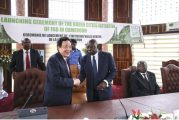Categories
Recent Posts
- Biya regime delays bond sale amid regional market strain
- Historic agreement between Nigeria and Cameroon to tackle wildlife crime
- Southern Cameroons refugees in Nigeria receive farm seedlings
- Douala: Investment Forum wraps up with honors for investment champions
- Understanding the Biya Francophone regime’s support for the Israeli genocide in Gaza
Archives
- April 2024
- March 2024
- February 2024
- January 2024
- December 2023
- November 2023
- October 2023
- September 2023
- August 2023
- July 2023
- June 2023
- May 2023
- April 2023
- March 2023
- February 2023
- January 2023
- December 2022
- November 2022
- October 2022
- September 2022
- August 2022
- July 2022
- June 2022
- May 2022
- April 2022
- March 2022
- February 2022
- January 2022
- December 2021
- November 2021
- October 2021
- September 2021
- August 2021
- July 2021
- June 2021
- May 2021
- April 2021
- March 2021
- February 2021
- January 2021
- December 2020
- November 2020
- October 2020
- September 2020
- August 2020
- July 2020
- June 2020
- May 2020
- April 2020
- March 2020
- February 2020
- January 2020
- December 2019
- November 2019
- October 2019
- September 2019
- August 2019
- July 2019
- June 2019
- May 2019
- April 2019
- March 2019
- February 2019
- January 2019
- December 2018
- November 2018
- October 2018
- September 2018
- August 2018
- July 2018
- June 2018
- May 2018
- April 2018
- March 2018
- February 2018
- January 2018
- December 2017
- November 2017
- October 2017
- September 2017
- August 2017
- July 2017
- June 2017
- May 2017
- April 2017
- March 2017
- February 2017
- January 2017
- December 2016
- November 2016
- October 2016
- September 2016
- August 2016
- July 2016
- June 2016
Featured
 Understanding the Biya Francophone regime’s support for the Israeli genocide in Gaza
Understanding the Biya Francophone regime’s support for the Israeli genocide in Gaza  Poverty under Biya: Cameroonians embrace Chinese language for brighter futures
Poverty under Biya: Cameroonians embrace Chinese language for brighter futures  Cameroon is broken: Who can fix it?
Cameroon is broken: Who can fix it?  Ethiopia: U.S Senator Cardin Statement on the Killing of Bate Urgessa
Ethiopia: U.S Senator Cardin Statement on the Killing of Bate Urgessa  Battle for the Unity Palace: ANNOUNCEMENT!
Battle for the Unity Palace: ANNOUNCEMENT!
Most Commented Posts
 4 Anglophone detainees killed in Yaounde
4 Anglophone detainees killed in Yaounde
19 comments Chantal Biya says she will return to Cameroon if General Ivo Yenwo, Martin Belinga Eboutou and Ferdinand Ngoh Ngoh are sacked
Chantal Biya says she will return to Cameroon if General Ivo Yenwo, Martin Belinga Eboutou and Ferdinand Ngoh Ngoh are sacked
13 comments Anglophone Nationalism: Barrister Eyambe says “hidden plans are at work”
Anglophone Nationalism: Barrister Eyambe says “hidden plans are at work”
12 comments The Anglophone Problem – When Facts don’t Lie
The Anglophone Problem – When Facts don’t Lie
12 comments Largest wave of arrest by BIR in Bamenda
Largest wave of arrest by BIR in Bamenda
10 comments
Latest Tweets
Featured
-

Biya regime delays bond sale amid regional market strain
-

Historic agreement between Nigeria and Cameroon to tackle wildlife crime
-

Southern Cameroons refugees in Nigeria receive farm seedlings
-

Douala: Investment Forum wraps up with honors for investment champions
-

Understanding the Biya Francophone regime’s support for the Israeli genocide in Gaza
-

US: Prosecution lays out ‘criminal conspiracy’ as Trump’s hush money trial opens
-

FAO formally launches Green Cities Initiative in Cameroon
© Cameroon Concord News 2024
15, October 2020
Deportation of Cameroonian Asylum Seekers: US makes a dramatic regression in the protection of human rights 0
On the 14th of October 2020, an airplane carrying onboard over 100 asylum seekers from the United States landed in the Douala International Airport in Cameroon into the waiting hands of the Cameroonian authorities stationed at the airport. Their fate is now a mystery.
Leaving one’s home country as a migrant to settle in and start living in another country has always been a challenging venture. It becomes not only challenging but difficult, daunting, and risky when you must flee from your country without prior notice due to persecution or war. Danger or menace to one’s life or that of your family members is a major reason for fleeing these days. One, therefore, flees from danger from their home country to become a refugee by seeking asylum.
The word ‘Asylum’ is a Latin form of the Greek word ‘asylon’ which in English means ‘freedom from…’ It is true that in International Law, states are not bound by any obligation to grant asylum to a refugee. However, nations are bound by the principle of non- refoulement as defined in article 33 of the 1951 convention relating to the status of refugees which prohibits the expulsion or return of refugees to areas they have fled from.
The case in hand is, therefore, a flagrant violation of the above-named convention. The United States should know better. It is rewarding that the United Kingdom of Great Britain and Northern Ireland, Germany, and many EU nations, still hold close to their hearts the protection of human rights and freedoms especially those of refugees and asylum seekers.
It has been before now, common knowledge that the United States, Britain, and France as allies, are among the best in the world when it comes to the protection of human rights and freedoms as well as the protection of refugees and asylum seekers. This writer is confident that if this were in the United Kingdom, the outcome would have been different at least not until all due processes followed and with strict respect for the rule of law.
With the recent deportation of vulnerable asylum seekers by the United States government to Cameroon, the United States has moved one step away from this prestigious circle of rights defenders. It is no news anywhere in the world that what is going on in the former British Southern Cameroons in particular, and Cameroon in general does not only constitute human rights abuses but genocide in gestation.
This writer has reason to believe that by this singular act, the US has shown the world that it partners the dictatorial regime in Yaoundé. What other reason can be given to justify sending asylum seekers back to a country they have fled from in the middle of a war?
It is equally worth noting that this group of mostly Former British Southern Cameroons asylum seekers was deliberately transferred months ago by the Immigration and Customs Enforcement (ICE) to the T. Don Hutto Residential Centre in Taylor, Texas. A detention facility that has been noted and stands out for its several allegations of human rights abuses and other degrading treatments of refugees and asylum seekers.
Based on recent figures from the UN High Commissioner for refugees, there has been a 56% increase in the number of people seeking political asylum from the Cameroons. And that number has increased since November 2016 due to the ongoing war in Former British Southern Cameroons.
It remains really strange and inexplicable how with all the statistics and evidence available on the ongoing crisis in Cameroon, and despite letters from some congressmen and women asking for the process to be delayed for more evidence, the Texas officials succeeded in deporting helpless asylum seekers to Cameroon, a country where the abuse of human rights has become a norm and a daily occurrence.
This process of deportation has smeared the dreadful image of the United States’ already injured human rights image. The country has missed an opportunity to demonstrate to the world that it does not side with the regime Yaoundé regime.
Nelson Agbor is an International Human Rights Law Scholar. He holds a Master of Laws (LLM), from Hertfordshire Law School, UK. He is currently a Doctoral Research Student, International Human Rights Law at Plymouth University, UK.